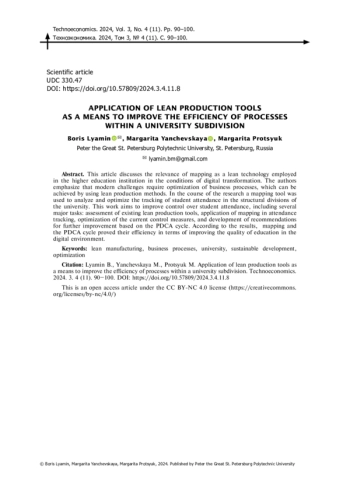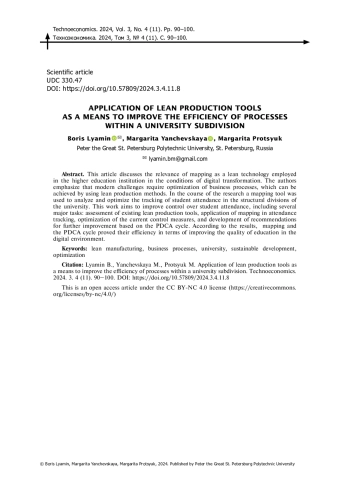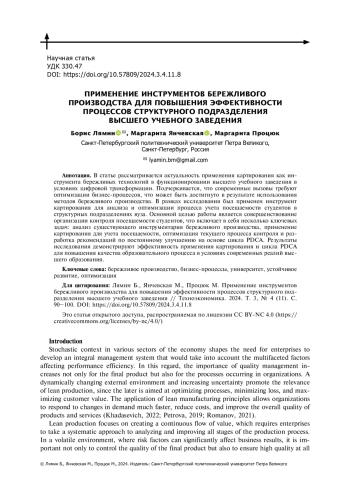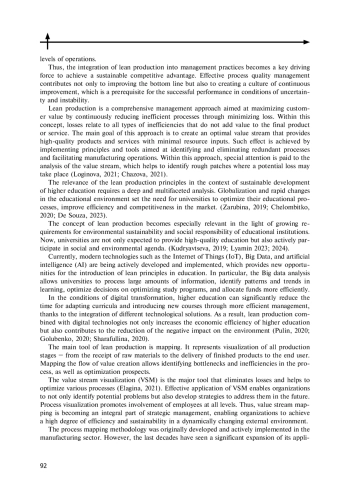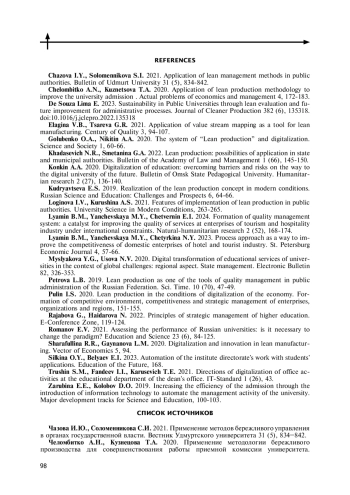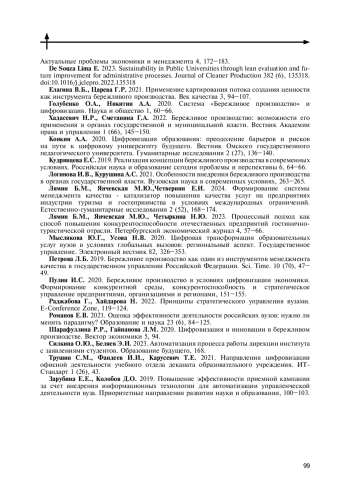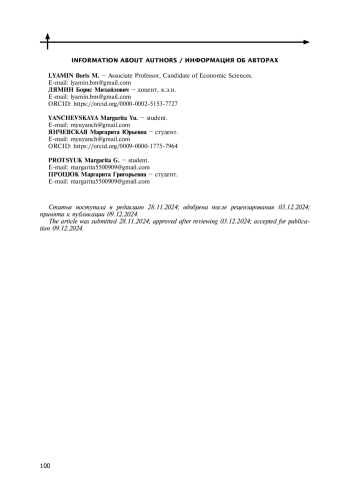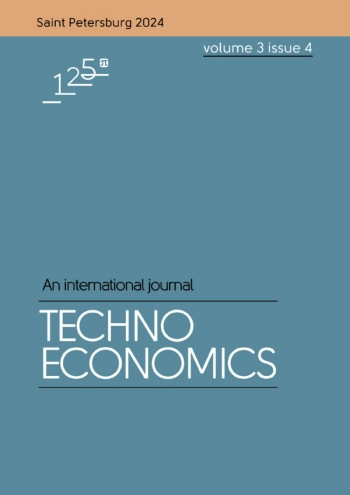This article discusses the relevance of mapping as a lean technology employed in the higher education institution in the conditions of digital transformation. The authors emphasize that modern challenges require optimization of business processes, which can be achieved by using lean production methods. In the course of the research a mapping tool was used to analyze and optimize the tracking of student attendance in the structural divisions of the university. This work aims to improve control over student attendance, including several major tasks: assessment of existing lean production tools, application of mapping in attendance tracking, optimization of the current control measures, and development of recommendations for further improvement based on the PDCA cycle. According to the results, mapping and the PDCA cycle proved their efficiency in terms of improving the quality of education in the digital environment.
Идентификаторы и классификаторы
Stochastic context in various sectors of the economy shapes the need for enterprises to develop an integral management system that would take into account the multifaceted factors affecting performance efficiency. In this regard, the importance of quality management increases not only for the final product but also for the processes occurring in organizations. A dynamically changing external environment and increasing uncertainty promote the relevance of lean production, since the later is aimed at optimizing processes, minimizing loss, and maximizing customer value. The application of lean manufacturing principles allows organizations to respond to changes in demand much faster, reduce costs, and improve the overall quality of products and services (Khadasevich, 2022; Petrova, 2019; Romanov, 2021).
Список литературы
1. Chazova I.Y., Solomennikova S.I. 2021. Application of lean management methods in public authorities. Bulletin of Udmurt University 31 (5), 834-842. EDN: ZQDEJH
2. Chelombitko A.N., Kuznetsova T.A. 2020. Application of lean production methodology to improve the university admission. Actual problems of economics and management 4, 172-183. EDN: GZFTHB
3. De Souza Lima E. 2023. Sustainability in Public Universities through lean evaluation and future improvement for administrative processes. Journal of Cleaner Production 382 (6), 135318. DOI: 10.1016/j.jclepro.2022.135318 EDN: XXJVSQ
4. Elagina V.B., Tsareva G.R. 2021. Application of value stream mapping as a tool for lean manufacturing. Century of Quality 3, 94-107. EDN: DYSFGV
5. Golubenko O.A., Nikitin A.A. 2020. The system of “Lean production” and digitalization. Science and Society 1, 60-66.
6. Khadasevich N.R., Smetanina G.A. 2022. Lean production: possibilities of application in state and municipal authorities. Bulletin of the Academy of Law and Management 1 (66), 145-150. EDN: TRXUQR
7. Konkin A.A. 2020. Digitalization of education: overcoming barriers and risks on the way to the digital university of the future. Bulletin of Omsk State Pedagogical University. Humanitarian research 2 (27), 136-140.
8. Kudryavtseva E.S. 2019. Realization of the lean production concept in modern conditions.Russian Science and Education: Challenges and Prospects 6, 64-66.
9. Loginova I.V., Kurushina A.S. 2021. Features of implementation of lean production in public authorities. University Science in Modern Conditions, 263-265.
10. Lyamin B.M., Yanchevskaya M.Y., Chetvernin E.I. 2024. Formation of quality management system: a catalyst for improving the quality of services at enterprises of tourism and hospitality industry under international constraints. Natural-humanitarian research 2 (52), 168-174. EDN: NFZNLL
11. Lyamin B.M., Yanchevskaya M.Y., Chetyrkina N.Y. 2023. Process approach as a way to improve the competitiveness of domestic enterprises of hotel and tourist industry. St. Petersburg Economic Journal 4, 57-66. EDN: XTHYTP
12. Myslyakova Y.G., Usova N.V. 2020. Digital transformation of educational services of universities in the context of global challenges: regional aspect. State management. Electronic Bulletin 82, 326-353. EDN: CMZJNT
13. Petrova L.B. 2019. Lean production as one of the tools of quality management in public administration of the Russian Federation. Sci. Time. 10 (70), 47-49.
14. Pulin I.S. 2020. Lean production in the conditions of digitalization of the economy. Formation of competitive environment, competitiveness and strategic management of enterprises, organizations and regions, 151-155.
15. Rajabova G., Haidarova N. 2022. Principles of strategic management of higher education. E-Conference Zone, 119-124.
16. Romanov E.V. 2021. Assessing the performance of Russian universities: is it necessary to change the paradigm? Education and Science 23 (6), 84-125. EDN: NBIMSI
17. Sharafullina R.R., Gaynanova L.M. 2020. Digitalization and innovation in lean manufacturing. Vector of Economics 5, 94. EDN: RGSGSY
18. Silkina O.Y., Belyaev E.I. 2023. Automation of the institute directorate’s work with students’ applications. Education of the Future, 168.
19. Trushin S.M., Fandeev I.I., Karusevich T.E. 2021. Directions of digitalization of office activities at the educational department of the dean’s office. IT-Standard 1 (26), 43.
20. Zarubina E.E., Kolobov D.O. 2019. Increasing the efficiency of the admission through the introduction of information technology to automate the management activity of the university. Major development tracks for Science and Education, 100-103.
Выпуск
Другие статьи выпуска
This research focuses on summarizing statistical data on the total number of students enrolled in Bachelor, Specialist, and Master programs from 2005 to 2021. As a result, a general decrease in the number of students is determined. This trend can be associated with such factors as changes in demography, society, economy, and educational policies. The authors suggest introducing lean technologies into the learning process as a means to increase the number of people involved in education. The evident recent stabilization indicates possible changes in education, highlighting the importance of further research. The integration of lean practices in higher education not only responds to current challenges but also creates conditions for sustainable development of the educational system in the long run.
This research focuses on summarizing statistical data on the total number of students enrolled in Bachelor, Specialist, and Master programs from 2005 to 2021. As a result, a general decrease in the number of students is determined. This trend can be associated with such factors as changes in demography, society, economy, and educational policies. The authors suggest introducing lean technologies into the learning process as a means to increase the number of people involved in education. The evident recent stabilization indicates possible changes in education, highlighting the importance of further research. The integration of lean practices in higher education not only responds to current challenges but also creates conditions for sustainable development of the educational system in the long run.
In recent years artificial intelligence (AI) has become an indispensable tool in digital marketing that is able to simplify human performance and expand business opportunities. This research considers the current AI (artificial intelligence) architectures in digital marketing, reflects on their impact on the activities of companies, and develops a range of optimization recommendations. The authors identify the most important tasks in evaluating existing solutions and their efficiency, as well as assess the possibilities of switching to AI technologies in business. Specific attention is also devoted to the examples of the neural networks implementation in marketing. As a result, the main components of the AI support architecture are identified, together with the further development prospects, with due consideration of current trends and ethical aspects. This research employs the practical achievements of marketing specialists and suggests a range of step-by-step strategies to optimize the business processes.
Recent geopolitical disagreements have caused tectonic changes in economic, technological and scientific ties between the North-South countries. Russia, as a country with the largest territory and substantial natural resources, found itself at the epicenter of these changes. Numerous sanctions adopted by the collective West after February 2022 created a new geopolitical reality, when Russia can rely only on its own intellectual and technological resources. In such external conditions, Russia will most likely be guided only by its national interests, with the climate agenda playing a secondary role. This research examines a conceptual model of transport mobility, when not the climate agenda, but technological development becomes the main dominant of development. The basis of such transport mobility is the existence of critical technologies and new economic mechanisms for their implementation. In this paper the possible implementation of such a new model is presented, in particular, on the basis of national-scale projects to create a country’s own technological base in the field of electric vehicle (EV) manufacturing, hydrogen fuel cell locomotives, and modern shipbuilding.
This article examines the implementation of chatbots in healthcare as a means to automate the patient flow management. The authors analyze the current state of this process, identify operational bottlenecks, and propose chatbot-based solutions for automation of patient registration, document processing, and room allocation. The research method rests on modelling using chatbot technologies and evaluating their overall impact on healthcare efficiency and service delivery. According to the results, the introduction of chatbots reduces administrative workload, facilitates paperwork, and significantly improves service quality. Specific attention is paid to the risks associated with chatbot implementation, such as privacy concerns, and strategies for their mitigation. As a result, the introduction of chatbots proved to have a significant positive impact on operational efficiency, resource optimization, and patient satisfaction in healthcare.
The healthcare industry makes one of the main components of the productive forces of the state. Therefore, the well-being and welfare of the entire society in the future depend on its thriving development. Despite significant accumulated knowledge in medicine, there are still some white spots that are difficult to analyze and predict. The use of artificial intelligence and neural networks in healthcare can significantly expand the analytical apparatus and radically change the existing approaches to scientific research. This article discusses the results of the practical application of artificial intelligence and artificial neural networks in healthcare. The research aims to demonstrate the prospects and advantages of using these information technologies in medicine; identify problems in the implementation of AI technologies in medical practice and offer possible solutions to some of them. The authors provide a comprehensive literature review on the issues of artificial intelligence and neural networks, consider successful examples of the AI use in pharmacology, forecasting, and research of various types of diseases, including cardiovascular system, dermatology, and oncology. A significant part of the research is devoted to ethical and legal concerns, as well as problems associated with the practical use of artificial intelligence. As a result of the research, the authors suggest the models of the IT architecture of a medical information system and data flows, based on the TOGAF standard.
This article discusses the possibility of predicting the values of a series using complex-valued autoregression with an error for short-term forecasting. The authors consider the basic concepts of the function of a complex-valued variable and the model of complexvalued autoregression, together with the results of applying first- and second-order models of complex-valued autoregression with the CARE(p) error to describe and predict the initial series. The results obtained are compared with the first- and second-order autoregression in real numbers. A complex-valued autoregression model with an error showed a more accurate result for short-term forecasting, unlike the autoregression model in real numbers. The authors also conclude that complex-valued autoregression with an error is subject to further investigation in order to find out the prospects of using its imaginary part.
The Russian economy is highly import-dependent, which is also relevant for the enterprises of the science-intensive industry. The later is based on the emerging realities, and strives to develop and introduce a strategy that would allow for the most efficient implementation of the planned import substitution program. In this research the authors have developed a comprehensive mathematical model that takes into account the peculiarities of the local labour and technical capital market, as well as their impact on the production costs of the sciencebased enterprise. The practical application of indicators that can define the current state and the level of dependence of science-based production on foreign raw materials will provide grounds for a revision of the existing development strategy. What is more, it will be possible to take into due consideration the mission of import substitution, based on the available resources of the enterprise and the maximum permissible share of imports in production.
Статистика статьи
Статистика просмотров за 2025 год.
Издательство
- Издательство
- Политех
- Регион
- Россия, Санкт-Петербург
- Почтовый адрес
- 195251, г.Санкт-Петербург, ул. Политехническая, дом 29
- Юр. адрес
- 195251, г Санкт-Петербург, Калининский р-н, ул Политехническая, д 29 литера б
- ФИО
- Рудской Андрей Иванович (РЕКТОР)
- E-mail адрес
- office@spbstu.ru
- Контактный телефон
- +7 (812) 2972077
- Сайт
- https://spbstu.ru
